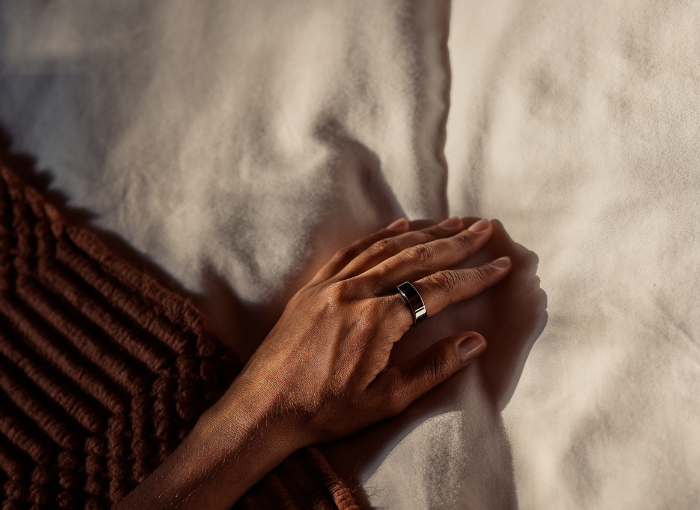- It’s normal to have the occasional bad night’s sleep – but if you’re constantly searching “how to get better sleep” it might be time to time to make some changes!
- Turn off the screens before bed, stick to a consistent bedtime, and sleep in a cold room, are just some tips for better sleep.
- Track your sleep with Oura to identify the habits that help or hurt – learn how to get more and better sleep today!
“Last night was rough. I feel like I barely slept.”
We’ve all uttered these familiar phrases more than a few times in our lives. You might find yourself experimenting with tips for better sleep – maybe your uncomfortable mattress is to blame, or maybe it was the nightcap.
This is where Oura comes in. Using Oura can help you identify specific habits to help you get more, and better, sleep – so you can finally crack the code and enjoy more restorative slumbers.
Learn how to get better sleep in these 10 simple sleep tips.
READ MORE: How Does the Oura Ring Track My Sleep?
10 Tips For Better Sleep
1. Give Your Screens a Break at Least 1 Hour Before Bed
Remind yourself that being snuggled under the covers is more comfortable than sitting on the couch! Plus, your phone could use a charge, right? Give your phone, tablet, or TV a break and give yourself some time to wind down before bed. By unplugging from the screens earlier, you can make sure your circadian rhythm isn’t disrupted by your screen’s blue light.
2. Stick to A Consistent Bedtime, Even on Weekends
Improving sleep starts with consistency, so becoming a creature of habit can go a long way. If you set a reasonable bedtime window and stick to it, even on weekends, it can help you maintain your natural circadian rhythm and be rested and ready when your morning alarm goes off.
| Member Tip: Oura members can discover their chronotype and ideal bedtime after 90 days of using Oura. Based on this, every night, you’ll get a notification encouraging you to start unwinding for bed. |
3. Find Your Ideal Room Temperature
Physiology and science indicate that the ideal nighttime room temperature is around 65 degrees Fahrenheit (18 degrees Celsius). Your body temperature decreases to initiate sleep, and gets progressively colder when you enter deep sleep, so a cool room can help you deepen your sleep more quickly.
4. Save Your Large Meals & Heavy Workouts for the Daytime
When you head to your favorite 24-hour late-night food establishment or hit the gym too close to bedtime, your deep sleep takes the hit. An elevated metabolism or heart rate can disrupt your sleep, so it’s best to avoid exercise and heavy meals in the 3 hours prior to your ideal bedtime.
| Member Tip: Want to see if your late-night meal impacted your sleep? Look at the nighttime resting heart rate graph on your Oura App. If your heart rate takes a long time to stabilize at night, your Recovery Index metric will be lower. |

READ MORE: How Late-Night Eating Can Impact Your Sleep
5. Schedule Some Time to Unwind Before Bed
Of course, this one is easier said than done. However, if you reserve time to unwind – by employing practices like mindful meditation, taking a relaxing bubble bath, or reading a novel – you train your body to enter a relaxed state in time for bed.
Think about it like you would a muscle: the more you practice engaging your rest-and-digest system while you’re awake, the easier it becomes to generate that same response at night and get some quality sleep.
| Member Tip: Oura members can access guided meditations, breathing exercises, and more in the Explore content on the Oura App. |
READ MORE: 14 Science-Backed Ways to Wind Down Before Bed
6. Trade That Late-Night Glass of Wine for Some Extra Sleep
Alcohol may help you feel relaxed before bed, but too much can rob you of highly valuable REM sleep. Once the alcohol’s effects wear off, and your hormones crash, you may also wake up continuously throughout the night.
READ MORE: How Alcohol Impacts Your Sleep
7. Move That Late-Night Espresso to Mid-Day
 The effects of a late afternoon coffee can last much longer than you think. Caffeine raises your heart rate, making it more difficult to fall asleep. It can also disrupt a key signal in your brain, adenosine, that helps your body regulate your internal clocks. Keep in mind that soda, tea, and even chocolate can contain enough caffeine to disrupt sleep as well.
The effects of a late afternoon coffee can last much longer than you think. Caffeine raises your heart rate, making it more difficult to fall asleep. It can also disrupt a key signal in your brain, adenosine, that helps your body regulate your internal clocks. Keep in mind that soda, tea, and even chocolate can contain enough caffeine to disrupt sleep as well.
8. Don’t Exercise Late But Do Exercise Regularly
While a late-night workout might not be recommended for sleep, you should try to stay active daily. Go for a run or just a casual walk around the block to avoid sitting for long periods. As little as thirty minutes of activity a day can set you up for a good night’s sleep.
| Member Tip: Oura automatically detects your activity, and when you’re not moving much – you might get an inactivity alert. This friendly reminder encourages you to stretch your legs to avoid long periods of being sedentary. |
9. Keep Your Bedroom for Rest & Recovery Only
Creating separation between your sleep and living spaces can make a big difference. Reserving your living room for media consumption and screen time can help you stick to tip #1 in this list.
Taking the TV out of the bedroom, leaving your phone charger on the kitchen counter, or making sure your work-from-home setup isn’t next to your bed, can help you establish a sleep-inducing environment. Your internal clocks respond to these sleep cues, and your body will thank you.
10. Naps Are Great for Recovery, but Remember to Time Them Right
And finally, taking a nap is a great way to rest and recover, but the timing of your nap matters! Try to take your naps before 3pm, as naps too close to your ideal bedtime can make it difficult to fall asleep and stay asleep at night.
READ MORE: How Long Should You Nap?
Deepen Your Sleep Tonight
If the idea of a good night’s sleep feels foreign to you, try out any or all of these tips for better sleep, and see how they impact your sleep quality. Stick with a new technique for at least a week to give your body time to adapt to the changes and reveal any effects. Remember: Rome wasn’t built in a day!
And, always remember, sleep is different for everyone. What works for some may not work for you. Try experimenting with a few of these strategies, discover what works, and hold on to what’s best for you, your body, and your sleep.
Oura members can refine their experimentation skills by tagging these habits on their Oura App with the Tags feature. For example, tag “cold bedroom” when you sleep with the AC on and see how impacts your sleep compared to a night with a warmer room.
READ MORE: Why Sleep Matters





